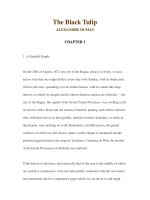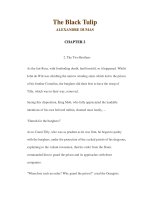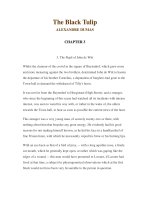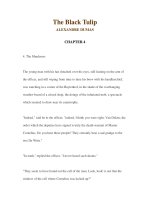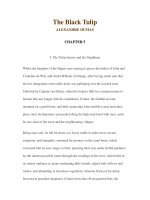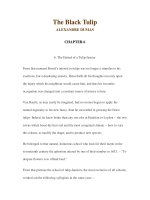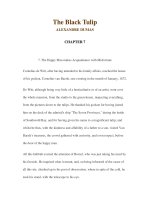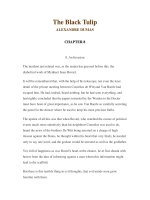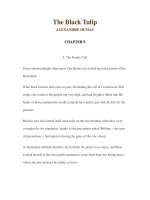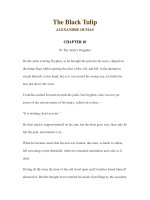LUYỆN ĐỌC TIẾNG ANH QUA CÁC TÁC PHẨM VĂN HỌC – THE MAN IN THE IRON MASK ALEXANDRE DUMAS CHAPTER 12 ppt
Bạn đang xem bản rút gọn của tài liệu. Xem và tải ngay bản đầy đủ của tài liệu tại đây (23.3 KB, 8 trang )
THE MAN IN THE IRON MASK
ALEXANDRE DUMAS
CHAPTER 12
The Wine of Melun
The King had, in point of fact, entered Melun with the intention of merely
passing through the city. The youthful monarch had an appetite for amusements.
Only twice during the journey had he been able to catch a glimpse of La
Valliere; and suspecting that his only opportunity of speaking to her would be
after nightfall, in the gardens, and after the ceremonial of reception had been
gone through, he had been very desirous to arrive at Vaux as early as possible.
But he reckoned without his captain of the Musketeers and without M. Colbert.
Like Calypso, who could not be consoled at the departure of Ulysses, our
Gascon could not console himself for not having guessed why Aramis had
asked Percerin to show him the King’s new costumes. “There is not a doubt,” he
said to himself, “that my friend the Bishop of Vannes had some motive in that”;
and then he began to rack his brains most uselessly. D’Artagnan, so intimately
acquainted with all the court intrigues, who knew the position of Fouquet better
even than Fouquet himself did, had conceived the strangest fancies and
suspicions at the announcement of the fête, which would have ruined a wealthy
man, and which became impossible, utter madness even, for a man so destitute
as he was. And then, the presence of Aramis, who had returned from Belle-Isle,
and been nominated by Fouquet inspector-general of all the arrangements; his
perseverance in mixing himself up with all the superintendent’s affairs; his visit
to Baisemeaux,- all this suspicious singularity of conduct had profoundly
perplexed d’Artagnan during the last few weeks.
“With men of Aramis’s stamp,” he said, “one is never the stronger except with
sword in hand. So long as Aramis continued a soldier, there was hope of getting
the better of him; but since he has covered his cuirass with a stole, we are lost.
But what can Aramis’s object be?” and d’Artagnan plunged again into deep
thought. “What does it matter to me, after all,” he continued, “if his only object
is to overthrow M. Colbert? And what else can he be after?” and d’Artagnan
rubbed his forehead,- that fertile land, whence the plough-share of his nails had
turned up so many and such admirable ideas. He at first thought of talking the
matter over with Colbert; but his friendship for Aramis, the oath of earlier days,
bound him too strictly. He revolted at the bare idea of such a thing; and, besides,
he hated the financier. He wished to unburden his mind to the King; but the
King would not be able to understand the suspicions which had not even the
solidity of a shadow. He resolved to address himself to Aramis directly, the first
time he met him. “I will take him,” said the musketeer, “between a couple of
candles suddenly; I will place my hand upon his heart, and he will tell me- What
will he tell me? Yes, he will tell me something; for, mordioux! there is
something underneath.”
Somewhat calmer, d’Artagnan made every preparation for the journey, and took
the greatest care that the military household of the King, as yet very
inconsiderable in numbers, should be well officered and well disciplined in its
limited proportions. The result was that through the captain’s arrangements, the
King, on arriving at Melun, saw himself at the head of the Musketeers, his
Swiss Guards, and a picket of the French Guards. It might almost have been
called a small army. M. Colbert looked at the troops with great delight; he even
wished there had been a third more in number.
“But why?” said the King.
“To show greater honor to M. Fouquet,” replied Colbert.
“To ruin him the sooner,” thought d’Artagnan.
When this little army appeared before Melun, the chief magistrates came out to
meet the King and to present him with the keys of the city, and invited him to
enter the Hotel de Ville to partake of the wine of honor. The King, who
expected to pass through the city and to proceed to Vaux without delay, became
quite red in the face from vexation.
“Who was fool enough to occasion this delay?” muttered the King, between his
teeth, as the chief magistrate was in the middle of a long address.
“Not I, certainly,” replied d’Artagnan; “but I believe it was M. Colbert.”
Colbert, having heard his name pronounced, said, “What was M. d’Artagnan
good enough to say?”
“I was good enough to remark that it was you who stopped the King’s progress,
so that he might taste the vin de Brie. Was I right?”
“Quite so, Monsieur.”
“In that case, then, it was you whom the King called some name or other.”
“What name?”
“I hardly know; but wait a moment, ‘idiot,’ I think it was,- no, no, it was ‘fool,’
‘fool,’ ‘stupid.’ That is what his Majesty said of the man who procured for him
the wine of Melun.”
D’Artagnan, after this broadside, quietly caressed his horse. M. Colbert’s large
head seemed to become larger than ever. D’Artagnan, seeing how ugly anger
made him, did not stop half-way. The orator still went on with his speech, while
the King’s color was visibly increasing. “Mordioux!” said the musketeer,
coolly, “the King is going to have an attack of determination of blood to the
head. Where the deuce did you get hold of that idea, M. Colbert? You have no
luck!”
“Monsieur,” said the financier, drawing himself up, “my zeal for the King’s
service inspired me with the idea.”
“Bah!”
“Monsieur, Melun is a city, an excellent city, which pays well, and which it
would be imprudent to displease.”
“There now! I, who do not pretend to be a financier, saw only one idea in your
idea.”
“What was that, Monsieur?”
“That of causing a little annoyance to M. Fouquet, who is making himself quite
giddy on his donjons yonder, in waiting for us.”
This was a home-stroke, and a hard one. Colbert was confounded by it, and
retired, thoroughly discomfited. Fortunately, the speech was now at an end. The
King drank the wine which was presented to him, and then all resumed their
course through the city. The King bit his lips in anger; for the evening was
closing in, and all hope of a walk with La Valliere was over. In order that the
whole of the King’s household should enter Vaux, four hours at least were
necessary, owing to the different arrangements. The King, therefore, who was
boiling with impatience, hurried forward as much as possible, in order to arrive
before nightfall. But at the moment he was setting off again, other and fresh
difficulties arose.
“Is not the King going to sleep at Melun?” said Colbert, in a low tone of voice,
to d’Artagnan.
M. Colbert must have been badly inspired that day, to address himself in that
manner to the chief of the Musketeers; for the latter guessed that the King’s
intention was very far from that of remaining where he was. D’Artagnan would
not allow him to enter Vaux except he were well and strongly accompanied, and
desired that his Majesty should not enter except with all the escort. On the other
hand, he felt that these delays would irritate that impatient character beyond
measure. In what way could he possibly reconcile these two difficulties?
D’Artagnan took up Colbert’s remark, and determined to repeat it to the King.
“Sire,” he said, “M. Colbert has been asking me if your Majesty does not intend
to sleep at Melun.”
“Sleep at Melun! What for?” exclaimed Louis XIV. “Sleep at Melun! Who, in
Heaven’s name, can have thought of such a thing, when M. Fouquet is
expecting us this evening?”
“It was simply,” returned Colbert, quickly, “the fear of causing your Majesty
any delay; for, according to established etiquette, you cannot enter any place,
with the exception of your own royal residences, until the soldiers’ quarters
have been marked out by the quartermaster, and the garrison has been properly
distributed.”
D’Artagnan listened with the greatest attention, biting his mustache; and the
Queens listened attentively also. They were fatigued, and would have liked to
go to rest without proceeding any farther, and especially to prevent the King
from walking about in the evening with M. de Saint-Aignan and the ladies of
the court; for if etiquette required the Princesses to remain within their own
rooms, the ladies of honor, as soon as they had performed the services required
of them, had no restrictions placed upon them, but were at liberty to walk about
as they pleased. It will easily be conjectured that all these rival interests,
gathering together in vapors, must necessarily produce clouds, and that the
clouds would be followed by a tempest. The King had no mustache to gnaw,
and therefore kept biting the handle of his whip instead, with ill-concealed
impatience. How could he get out of it? D’Artagnan looked as agreeable as
possible, and Colbert as sulky as he could. Who was there, then, with whom
Louis could get in a passion?
“We will consult the Queen,” said Louis XIV, bowing to the royal ladies.
This kindness of consideration softened Maria Theresa’s heart, who was of a
kind and generous disposition, and who, left to her own free will, replied: “I
shall be delighted to do whatever your Majesty wishes.”
“How long will it take us to get to Vaux?” inquired Anne of Austria, in slow
and measured accents, placing her hand upon her suffering bosom.
“An hour for your Majesties’ carriages,” said d’Artagnan; “the roads are
tolerably good.”
The King looked at him. “And a quarter of an hour for the King,” he hastened to
add.
“We should arrive by daylight,” said Louis XIV.
“But the billeting of the King’s military escort,” objected Colbert, softly, “will
make his Majesty lose all the advantage of his speed, however quick he may
be.”
“Double ass that you are!” thought d’Artagnan; “if I had any interest or motive
in demolishing your credit, I could do it in ten minutes. If I were in the King’s
place,” he added, aloud, “I should, in going to M. Fouquet, leave my escort
behind me. I should go to him as a friend; I should enter accompanied only by
my captain of the Guards. I should consider that I was acting more nobly, and
should be invested with a still more sacred character by doing so.”
Delight sparkled in the King’s eyes. “That is, indeed, a very good suggestion.
We will go to see a friend as friends. Those gentlemen who are with the
carriages can go slowly; but we who are mounted- Forward!” and he rode off,
accompanied by all those who were mounted.
Colbert hid his ugly head behind his horse’s neck.
“I shall be quits,” said d’Artagnan, as he galloped along, “by getting a little talk
with Aramis this evening. And then, M. Fouquet is a man of honor. Mordioux! I
have said so, and it must be so.”
In this way, towards seven o’clock in the evening, without trumpets, without
advanced guard, without outriders or musketeers, the King presented himself
before the gate of Vaux, where Fouquet, who had been informed of his royal
guest’s approach, had been waiting for the last half-hour, with his head
uncovered, surrounded by his household and his friends.
